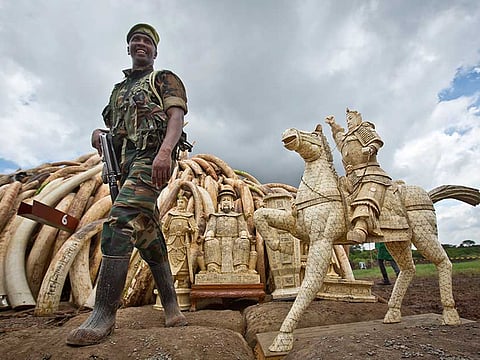Kenya holds summit to stop elephant slaughter
On Saturday, the country sets fire to nearly its entire ivory stockpile

NANYUKI, Kenya: From anti-poaching commandos deployed by helicopter to boosting court prosecutions: Kenya on Friday hosted a summit on how to end ivory trafficking and prevent the extinction of elephants in the wild.
Kenyan President Uhuru Kenyatta is heading the meeting which groups African heads of state and conservationists in the central town of Nanyuki to boost awareness of the threat of poaching.
On Saturday, the country sets fire to nearly its entire ivory stockpile.
The bonfire will be the largest-ever torching of ivory, involving 105 tonnes from thousands of dead elephants, dwarfing by seven times any stockpile burnt before.
Africa is home to between 450,000 to 500,000 elephants, but more than 30,000 are killed every year on the continent to satisfy demand for ivory in Asia, where raw tusks sell for around $1,000 (800 euros) a kilo (2.2 pounds).
The summit aims to raise global awareness and eventually achieve a total ban on ivory trade, while highlighting the multiple methods used in the fight against poachers, from the frontline, where rangers are out on patrol, to the courtroom.
The day long talks aim to examine “how we can expand these efforts across the continent,” said Max Graham, head of the Space for Giants conservation group, which helped organise the meeting.
In Kenya, the combined efforts of government and private game reserves have helped cut poaching, with the number of elephants killed in 2015 down to 93 from 164 the previous year.
In the Ol Pejeta private reserve near Nanyuki, a rapid response team of armed rangers who travel by helicopter has been hard at work since 2011.
Equipped with night vision gear, encrypted radio communications, guns and sniffer dogs, and trained by British ex-special forces, the teams have helped slash poaching.
Although the military-style approach is effective, it costs up to $2 million (Dh7.35 million) a year.
Kenya is also trying to boost prosecution efforts, with five major cases against traffickers currently in court in the port city of Mombasa — a key point on the smuggling route to Asia, according to Space for Giants’ legal expert Shamini Janyanathan.
But in a country plagued by corruption, the conviction of key figures involved in poaching and smuggling remains rare.
The Convention on International Trade in Endangered Species of Wild Fauna and Flora (CITES) banned the ivory trade in 1989.
China, which has tightened its laws on ivory imports, allows the resale of ivory bought before the 1989 ban, but activists say the trade in legal ivory acts as a cover for illegal imports and call for a complete ban on sales.
Graham notes that anti-poaching efforts is only one part of the response, and that cutting the demand is the “ultimate solution.”
In the meantime, protecting elephants means they wont be wiped out before the demand can be stopped.
“The challenge is we don’t know how long it’s going to take for that demand to drop off. Is it one year, is it five years? So what we need in the interim is a holding position,” Graham said.
“It means once this poaching wave has passed, once the demand for ivory and rhino horn has passed, we still have reservoirs for these magnificent animals”.
— AFP


![The incident occurred in the early hours of Tuesday in Kampani Zurak community, located in the Wase area of Plateau state. [Illustrative image]](http://media.assettype.com/gulfnews%2Fimport%2F2022%2F12%2F13%2FSTOCK-ambulance_1850a298a2c_large.jpg?w=320&auto=format%2Ccompress&fit=max)
